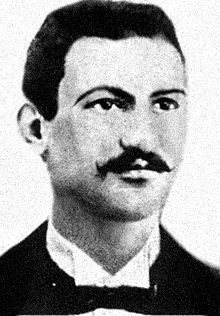Gaetano Bresci
| Gaetano Bresci | |
|---|---|
 |
|
| Born |
10 November 1869 Coiano, Prato, Tuscany |
| Died | 22 May 1901 (aged 31) Santo Stefano Island, Ventotene, Latina, Lazio |
| Nationality | Italian |
| Occupation | Weaver |
| Criminal penalty | Life imprisonment |
| Criminal status | Deceased |
| Conviction(s) | Murder of Umberto I |
Gaetano Bresci (Italian pronunciation: [ɡaeˈtano ˈbreʃʃi]; November 10, 1869 – May 22, 1901) was an Italian anarchist who assassinated King Umberto I of Italy. Bresci was the first European regicide offender not to be executed, as capital punishment in Italy had been abolished since 1889.
Bresci was born at Coiano, near Prato, Tuscany, and emigrated from Italy to the United States, making his living as a weaver in Paterson, New Jersey, which had a large Italian-American community. He became involved with and later a leading member of an Italian political group called "Gruppo diritti all' esistenza". He was one of the founders of La Questione Sociale, the Italian language anarchist paper published in Paterson. According to Emma Goldman:
He was a skillful weaver, considered by his employers as a sober, hard-working man, but his pay averaged only fifteen dollars a week. He had a wife and child to support; yet he managed to donate weekly contributions to the paper. He had even saved a hundred and fifty dollars, which he lent to the group at a critical period of La Questione Sociale. His free evenings and Sundays he used to spend in helping with the office work and in propaganda. He was beloved and respected for his devotion by all the members of his group.
In 1898, high bread prices led to demonstrations all over Italy. In Milan, an unarmed crowd of protestors marched toward the palace, which was surrounded by a strong military force under the command of General Fiorenzo Bava-Beccaris. The crowd ignored the order to disperse, whereupon Bava-Beccaris gave the signal to fire with muskets and cannons, resulting in a massacre of the demonstrators, in which more than ninety people died.
...
Wikipedia
